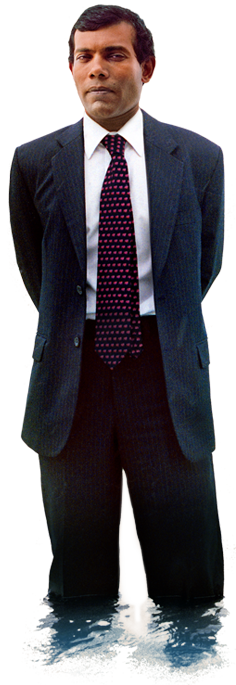SYNOPSIS
SYNOPSIS
ON FEBRUARY 7, 2012, MOHAMED NASHEED RESIGNED THE PRESIDENCY UNDER THE THREAT OF VIOLENCE IN A COUP D'ETAT PERPETRATED BY SECURITY FORCES LOYAL TO THE FORMER DICTATOR. THIS FILM IS THE STORY OF HIS FIRST YEAR IN OFFICE.
Jon Shenk’s The Island President is the story of President Mohamed Nasheed of the Maldives, a man confronting a problem greater than any other world leader has ever faced—the literal survival of his country and everyone in it. After bringing democracy to the Maldives after thirty years of despotic rule, Nasheed is now faced with an even greater challenge: as one of the most low-lying countries in the world, a rise of three feet in sea level would submerge the 1200 islands of the Maldives enough to make them uninhabitable.
The Island President captures Nasheed’s first year of office, culminating in his trip to the Copenhagen Climate Summit in 2009, where the film provides a rare glimpse of the political horse-trading that goes on at such a top-level global assembly. Nasheed is unusually candid about revealing his strategies—leveraging the Maldives’ underdog position as a tiny country, harnessing the power of media, and overcoming deadlocks through an appeal to unity with other developing nations. When hope fades for a written accord to be signed, Nasheed makes a stirring speech which salvages an agreement. Despite the modest size of his country, Mohamed Nasheed has become one of the leading international voices for urgent action on climate change.
LONG VERSION
Jon Shenk’s The Island President tells the story of President Mohamed Nasheed of the Maldives, a man confronting a problem greater than any other world leader has ever faced—the literal survival of his country and everyone in it.
After leading a twenty-year pro-democracy movement against the brutal regime of Maumoon Abdul Gayoom, surviving repeated imprisonments and torture, Nasheed became president at 41, only to encounter a far more implacable adversary than a dictator—the ocean. Considered the lowest lying country in the world, a rise of a mere three meters in sea level would inundate the Maldives, rendering the country practically unlivable. Unless dramatic changes are made by the larger countries of the world, the Maldives, like a modern Atlantis, will disappear under the waves.
As much as its plight is one-of-a-kind, the Maldives itself is a country like no other. A Shangri-la of breathtakingly beautiful turquoise reefs, beaches, and palm trees, the Maldives is composed of 1200 coral islands off of the Indian sub-continent, of which 200 are inhabited. Arrayed across 400 miles of open sea like necklace-shaped constellations, the Maldives is one of the most geographically dispersed nations on earth.
Democracy came to the Maldives, a Sunni Muslim country, in 2008, in a way that was uncannily similar to the recent Middle Eastern populist revolts against autocrats in Tunisia, Egypt, and elsewhere. What made the Maldives movement different from the ones that have followed it is the existence of a clear opposition party, the Maldivian Democratic Party (MDP), which had in its co-founder, Nasheed, a popular and charismatic leader ready to usher his country into democracy. Educated in Sri Lanka and England, Nasheed proved to be an unusually shrewd and sophisticated politician who grasped that the only way he could stand up to the catastrophic issues of climate change facing his country would be to take the Maldives cause to the world stage.
The Island President captures Nasheed’s first year of office, a time when he influences the direction of international events in a way that few leaders have ever done, even in countries many times the size of the Maldives. Nasheed’s story culminates in his trip to the Copenhagen Climate Summit in 2009, where the film provides a rare glimpse of the political horse-trading that goes on at such a top-level global assembly. Nasheed is unusually candid about revealing his strategies—leveraging the Maldives’ underdog position, harnessing the power of media, and overcoming deadlocks through an appeal to unity with other developing nations. Despite his country’s dire situation, Nasheed remains cool, pragmatic and flexible, willing to compromise and try again another day. When all hope fades for any kind of written accord to be signed, Nasheed makes a stirring speech which salvages an agreement. While Copenhagen is judged by many as a failure, it marked the first time in history that China, India, and the United States agreed to reduce carbon emissions.
In this age of political consultants and talking points, it is almost unheard of nowadays for filmmakers to get the astonishing degree of access that director Jon Shenk and his filmmaking team secured from Nasheed in The Island President. An award-winning cinematographer as well as a director, Shenk suffuses The Island President with the unearthly beauty of the Maldives. Seen from the sky, set against the haunting music of Radiohead, the coral islands seem unreal, more like glowing iridescent creatures than geographic areas. The parallel is apt, as the Maldives are as endangered as any species, and unless strong actions are taken, this magical country could become extinct.
IN FEBRUARY 2012, MOHAMED NASHEED RESIGNED THE PRESIDENCY UNDER THE THREAT OF VIOLENCE IN A COUP D'ETAT PERPETRATED BY SECURITY FORCES LOYAL TO THE FORMER DICTATOR.




